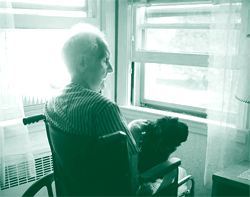April 2009
In this Issue
New Housing on the Horizon
Residential Communities by Design
Limited-Equity Cooperative Creates Affordable Housing in DC
HUD Pursues Energy Efficiency Nationwide
In the next issue of ResearchWorks
New Housing on the Horizon
Many seniors and people with disabilities will be better able to find affordable housing, thanks to over $650 million in recently announced HUD grants. The funding, available through HUD's Section 202 and Section 811 programs, offers interest-free capital advances to nonprofit organizations that will produce accessible housing, subsidize rents, and provide supportive services, which, in turn, will enable qualifying participants to live independently.

Of the $650 million awarded, $525.9 million in Section 202 funds will assist very-low-income seniors who are at least 62 years old. In addition to funding the construction, acquisition, and rehabilitation of multifamily developments, the program subsidizes the rents of senior citizens in a way that limits residents' housing costs to 30 percent of their incomes. The remaining $124.5 million will assist very-low-income people with disabilities who participate in HUD's Section 811 program. The grant funds will be invested primarily in smaller, newly constructed residences, typically group homes or condominium units. The Section 811 program also subsidizes rents by the amount that exceeds 30 percent of participants' incomes. To qualify, households must have at least one very-low-income adult with a physical or developmental disability or a chronic mental illness.
Here are just a few examples of how the nearly 200 nonprofit grantees around the country plan to use their funds.
Section 202 Projects Under Development

A Connecticut chapter of the American Hellenic Educational Progressive Association's National Housing Corporation (ANHC) is using its capital advance of $7.9 million to construct and subsidize 52 one-bedroom, one-bath apartments for the elderly. The complex will provide a community room with a kitchen, as well as dedicated spaces for arts and crafts, a library, exercise room, and laundry facilities. This ANHC chapter will also use its funding to provide $742,800 in rental subsidies over a 3-year period.
Further south, the Georgia Rehabilitation Institute of Harlem, Georgia will use its $1.6 million to develop a 16-unit complex of Section 202 housing. The resulting 15 one-bedroom apartments will be universally accessible and barrier-free, regardless of mobility limitations. A two-bedroom apartment is reserved for an onsite manager. Adding to the accessibility features of the complex, the development will be in close proximity to shopping and health facilities.
Out west, the St. Vincent de Paul Salvage Bureau in Coeur d'Alene, Idaho will use its multimillion-dollar Section 202 capital advance to build 36 one-bedroom units on land it leases from the city for $1 per year. Some of the capital advance funds ($369,000) are reserved for 3-year rental subsidies. The city will devote Community Development Block Grant program funds to this project in order to complete necessary street and infrastructure improvements.
Section 811 Housing
In the Northwest, ShelterCare of Springfield, Oregon was awarded nearly $2 million to construct Section 811 housing for adults with chronic mental illnesses. As the first phase of a mixed-use urban development, ShelterCare is building 16 one-bedroom apartments near public transit, a library, city services, and shopping. Residents of these apartments will receive supportive services and rent subsidies from ShelterCare. When complete, the mixed-use development will include additional housing, a church, community facilities, and retail stores.
A capital grant of $840,800 was awarded to Mosaic to construct two group homes on a single site in Memphis, Tennessee. Both group residences will feature four units — each with either one or two bedrooms — designed to encourage social interaction while respecting privacy. Mosaic expects 12 residents with disabilities to occupy the eight rent-assisted units. Laundry facilities, an interior common area, and a multipurpose activity room are included. Mosaic will offer programs and activities that meet residents' social, recreational, health, and educational needs.
Our brief tour of new, HUD-financed affordable development concludes close to our nation's midsection, where two agencies in Ohio — Filling Memorial Home of Mercy and Luther Home of Mercy — were each awarded $1.4 million to build a total of 24 units in clusters of three on scattered sites. In addition to including energy-efficient features, the ranch-style group homes will be architecturally similar to nearby housing, thus blending neatly into their surrounding neighborhoods. Each home will feature four private bedrooms; two fully handicapped accessible bathrooms; living, dining, and laundry rooms; and storage areas with a two-car garage. Both nonprofits intend to offer a variety of supportive services in addition to rental subsidies.
Additional information on HUD's Section 202 and 811 programs can be found at www.hud.gov/offices/hsg/mfh/progdesc/eld202.cfm and www.hud.gov/offices/hsg/mfh/progdesc/disab811.cfm, respectively. A complete list of grant recipients and their plans is available at www.hud.gov/content/releases/pr09-007.pdf.

